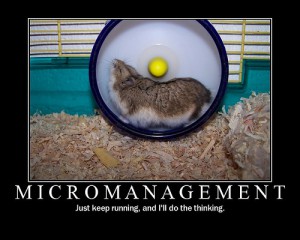 Ever wonder why your collaboration effort has stalled out? Or why your supplier is lacking innovation? I’d hypothesize it might be micromanagement.
Ever wonder why your collaboration effort has stalled out? Or why your supplier is lacking innovation? I’d hypothesize it might be micromanagement.
In fact, micromanagement lurks at the heart of several of the most common ailments that plague or destroy business relationships, including the Outsourcing Paradox, the Activity Trap, Measurement Minutiae, and the Junkyard Dog Factor.
Jessica Marie’s article on LinkedIn’s Pulse, “Micromanagers: Flushing Companies Down the Toilet, One Detail at a Time”, offers some good observations and insights. In it, she describes the dynamics of micromanagement very succinctly: “People don’t leave bad companies. They leave bad bosses. They don’t leave flawed organizational structures and abandon lousy products and technology. They leave flawed leadership.”
Her point is that even the most technologically advanced companies can stumble badly when those in charge lack “emotional intelligence,” are insecure and operate with incompetence. And much of the time the fault lies at the doorstep of the micromanager; he or she “negatively affects efficiency, creativity, trust, communication, problem-solving, and the company’s ability to reach its goals.”
There’s a big difference between directing co-workers rather than empowering them. Just thinking about the culture that’s embodied in a micromanaged environment makes me queasy! And that difference extends to supplier or business partner relationships.
Marie also makes an insightful point about micromanagers—their actions and reactions are fear-based. They need to control process details to the nth degree, and prevent or avoid confrontation because they are insecure. Insecurity leads to fear. She identifies five characteristics of the non-micromanaging boss: communication, delegation, fairness, humility and responsibility.
To those I’d add openness, curiosity, motivation and trust.
The Vested business model can’t function in a micromanaged environment: people are pulling on the rope together to operate the business and to resolve problems; they are empowered under a flexible governance framework to do what they do best and collaboratively innovate for the success of the partnership.
Bottom line, high-level collaboration and micromanagement are terms that don’t mix.
Image: Micromanagement by LiquidCipher via Flickr cc